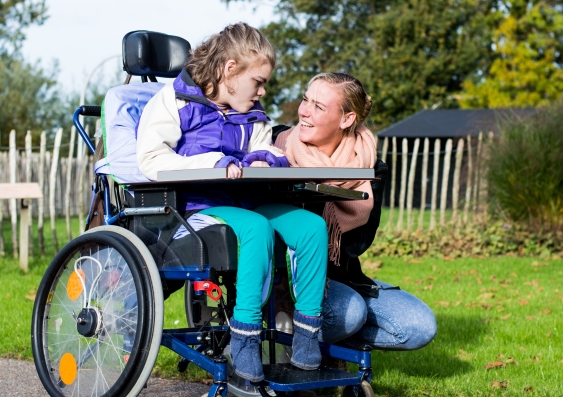The forgotten workers of Australia’s COVID-19 era
A survey of more than 2300 disability workers shows that the sector is being seriously overlooked in this pandemic.
A survey of more than 2300 disability workers shows that the sector is being seriously overlooked in this pandemic.

Rachel Gray
Media and Content
0411 987 771
rachel.gray1@unsw.edu.au
Disability workers fear a lack of support for the sector means they could be hit hard by a COVID-19 outbreak.
This is the outcome of a new research report titled The disability workforce and COVID-19: initial experiences of the outbreak which provides analysis of data collected in March by UNSW’s Dr Natasha Cortis and Dr Georgia van Toorn.
Dr Cortis, from the Social Policy Research Centre, says the report shows the very high risks experienced among disability support workers in the early stages of the pandemic.

Dr Natasha Cortis
“The survey picked up extreme anxiety among workers about their safety in the workplace and the safety of their clients,” Dr Cortis says.
“Many described working with very little support, and a lack of personal protective equipment. They also felt stretched, as they lacked access to the additional resources needed to properly support people with disabilities adjust to safe distancing measures.”
Dr Georgia van Toorn, from UNSW Arts & Social Sciences, says disability workplaces are not prepared for a health crisis of this scale and some have been very slow to respond.
“Some employers are refusing to set foot into workplaces, where they are still insisting that workers carry on as usual, without adequate PPE,” Dr van Toorn says.
Workers “are being squeezed between the need to protect themselves and their families, and the need to work to make ends meet,” she says.

Dr Georgia Van Toorn
“The physical and mental health and safety of disability workers needs to be prioritised alongside that of health practitioners and other essential workers,” Dr van Toorn says.
“Compensation in the form of hazard pay is warranted given the heightened risks for workers, and would help ease financial pressures on an already overworked and under-paid workforce.”
The responses in the survey are based on the experiences of 2,341 disability workers across Australia.
The following excerpts show some of the responses received in the survey:
“It is impossible in many situations to do our job and assist clients without getting close up …. This outbreak calls for more protective measures than just wiping things down and using the infection control kit.”
“Since the arrival of COVID-19, every time I head to work it feels like Russian Roulette. Knowing that we have not been supplied with basic safety equipment, for example: hand sanitiser, anti-bacterial hand wash, masks, shoe covers etc, does not make me feel safe.”
“My organisation is completely unprepared for an outbreak with no clear contingency plans, lack of PPE and inadequate training. The General Manager displays a lack of leadership and decision-making capabilities, referring to the pandemic as "just the flu" and suggesting people are panicking. The inaction and attitude thus far could lead to loss of lives among our vulnerable client group and older staff.”
“Due to lack of staffing we have one staff to five residents. And with the general workload, and extra workload because of the virus, we don’t have time to also do extra activities and keep their spirits up with being shut in the house.”
Dr Cortis says the disability sector has been overlooked in the national response to COVID-19.
“The support the government has put in place for people with disabilities and disability support workers is patchy at best. I don’t know why this service system has been overlooked,” she says.
The Disability Workforce and COVID-19 survey is a part of a larger report titled Working in New Disability Markets: a survey of Australia's disability workforce, which is due out in mid-May.
The report has been commissioned by the Health Services Union, the United Workers Union and the Australian Services Union, which represent workers across the disability sector.
The report will offer valuable insights to the status of the sector “because there's no other large data set that shows how workers themselves experience their work, and the ways disability support work is changing,” Dr Cortis says.
HSU National Secretary Lloyd Williams said in a statement that the severe lack of support for disability support workers must change.
“Disability workers are essential workers. They provide critical services to the most vulnerable people in our community and deserve the additional support,” he said.
The unions recently filed an application to have a COVID-19 Care Allowance included in the Social, Community, 91���˰涶�� Care and Disability Services Industry Award 2010.